Unit5知识点总结
- 格式:doc
- 大小:67.50 KB
- 文档页数:4
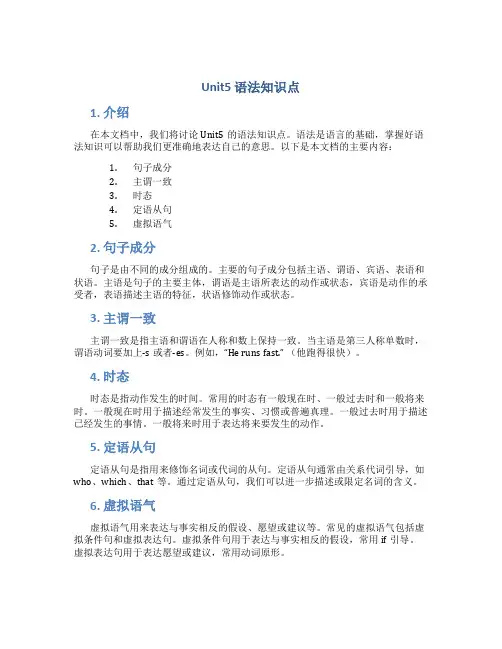
Unit5 语法知识点1. 介绍在本文档中,我们将讨论Unit5的语法知识点。
语法是语言的基础,掌握好语法知识可以帮助我们更准确地表达自己的意思。
以下是本文档的主要内容:1.句子成分2.主谓一致3.时态4.定语从句5.虚拟语气2. 句子成分句子是由不同的成分组成的。
主要的句子成分包括主语、谓语、宾语、表语和状语。
主语是句子的主要主体,谓语是主语所表达的动作或状态,宾语是动作的承受者,表语描述主语的特征,状语修饰动作或状态。
3. 主谓一致主谓一致是指主语和谓语在人称和数上保持一致。
当主语是第三人称单数时,谓语动词要加上-s或者-es。
例如,“He runs fast.” (他跑得很快)。
4. 时态时态是指动作发生的时间。
常用的时态有一般现在时、一般过去时和一般将来时。
一般现在时用于描述经常发生的事实、习惯或普遍真理。
一般过去时用于描述已经发生的事情。
一般将来时用于表达将来要发生的动作。
5. 定语从句定语从句是指用来修饰名词或代词的从句。
定语从句通常由关系代词引导,如who、which、that等。
通过定语从句,我们可以进一步描述或限定名词的含义。
6. 虚拟语气虚拟语气用来表达与事实相反的假设、愿望或建议等。
常见的虚拟语气包括虚拟条件句和虚拟表达句。
虚拟条件句用于表达与事实相反的假设,常用if引导。
虚拟表达句用于表达愿望或建议,常用动词原形。
7. 总结在本文档中,我们介绍了Unit5的语法知识点。
通过学习句子成分、主谓一致、时态、定语从句和虚拟语气,我们可以更好地理解和运用英语语法。
希望本文对您的学习有所帮助。
感谢阅读本文档!-End-。
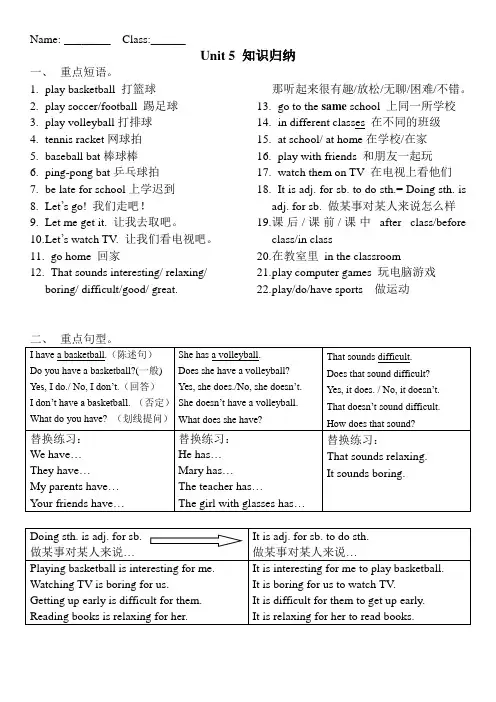
Name: ________ Class:______Unit 5 知识归纳一、重点短语。
1.play basketball 打篮球2.play soccer/football 踢足球3.play volleyball打排球4.tennis racket网球拍5.baseball bat棒球棒6.ping-pong bat乒乓球拍7.be late for school上学迟到8.Let’s go! 我们走吧!9.Let me get it. 让我去取吧。
10.L et’s watch TV. 让我们看电视吧。
11.go home 回家12.That sounds interesting/ relaxing/boring/ difficult/good/ great.那听起来很有趣/放松/无聊/困难/不错。
13.go to the same school 上同一所学校14.in different classes 在不同的班级15.at school/ at home在学校/在家16.play with friends 和朋友一起玩17.watch them on TV 在电视上看他们18.It is adj. for sb. to do sth.= Doing sth. isadj. for sb. 做某事对某人来说怎么样19.课后/课前/课中after class/beforeclass/in class20.在教室里in the classroom21.p lay computer games 玩电脑游戏22.p lay/do/have sports 做运动三、作文范文。
My name is Gina. I like doing sports. It is interesting for me.I have eight tennis balls, two volleyballs and five soccer balls, but I don’t have a baseball. I have a good friend Jack. We are in the same school. He has a ping-pong ball and two ping-pong bats. After school, he can play it with his classmates. He thinks it’s relaxing. He likes basketball very much. But he only watches it on TV. It’s difficult.It’s time for sports. Let’s play soccer. Come on!。
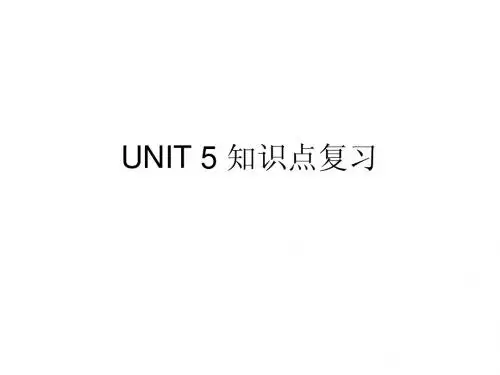
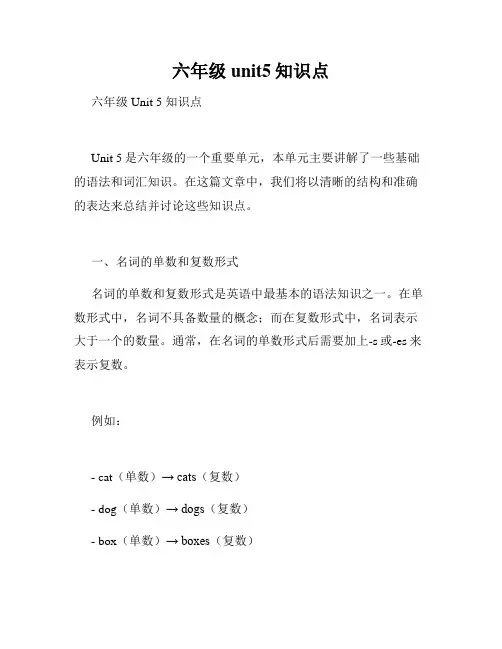
六年级unit5知识点六年级Unit 5 知识点Unit 5是六年级的一个重要单元,本单元主要讲解了一些基础的语法和词汇知识。
在这篇文章中,我们将以清晰的结构和准确的表达来总结并讨论这些知识点。
一、名词的单数和复数形式名词的单数和复数形式是英语中最基本的语法知识之一。
在单数形式中,名词不具备数量的概念;而在复数形式中,名词表示大于一个的数量。
通常,在名词的单数形式后需要加上-s或-es来表示复数。
例如:- cat(单数)→ cats(复数)- dog(单数)→ dogs(复数)- box(单数)→ boxes(复数)需注意的是,还有一些名词变复数的方式比较特殊,需要特别记忆和掌握。
因此,在学习名词复数形式时,我们需要多进行练习和记忆,以加深理解。
二、形容词的比较级和最高级形容词的比较级和最高级是用来表示两个或多个事物之间的比较关系的语法结构。
通常,我们在形容词前面加上-er来表示比较级,加上-est来表示最高级。
例如:- tall(高的)→ taller(更高的)→ tallest(最高的)- big(大的)→ bigger(更大的)→ biggest(最大的)- happy(快乐的)→ happier(更快乐的)→ happiest(最快乐的)有些形容词的比较级和最高级形式是不规则的,我们需要通过大量的练习来熟悉和掌握。
三、动词的过去式和过去分词形式动词的过去式和过去分词形式是用来表示动作发生在过去时态的语法形式。
通常,我们在动词的原型后面加上-ed来表示过去式和过去分词。
例如:- play(玩耍)→ played(玩耍过)→ played(被玩耍过)- dance(跳舞)→ danced(跳过舞)→ danced(被跳过舞)需要注意的是,有些动词的过去式和过去分词形式是不规则的,我们需要通过记忆和练习来掌握。
四、副词的用法副词是用来修饰动词、形容词或其他副词的一种词类。
副词可以用来表示动作的方式、频率、地点等。
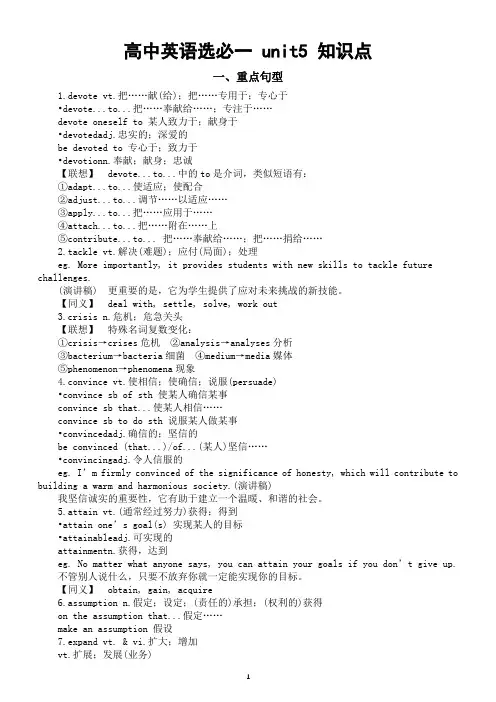
高中英语选必一 unit5 知识点一、重点句型1.devote vt.把……献(给);把……专用于;专心于•devote...to...把……奉献给……;专注于……devote oneself to 某人致力于;献身于•devotedadj.忠实的;深爱的be devoted to 专心于;致力于•devotionn.奉献;献身;忠诚【联想】devote...to...中的to是介词,类似短语有:①adapt...to...使适应;使配合②adjust...to...调节……以适应……③apply...to...把……应用于……④attach...to...把……附在……上⑤contribute...to... 把……奉献给……;把……捐给……2.tackle vt.解决(难题);应付(局面);处理eg. More importantly, it provides students with new skills to tackle future challenges.(演讲稿) 更重要的是,它为学生提供了应对未来挑战的新技能。
【同义】deal with, settle, solve, work out3.crisis n.危机;危急关头【联想】特殊名词复数变化:①crisis→crises危机②analysis→analyses分析③bacterium→bacteria细菌④medium→media媒体⑤phenomenon→phenomena现象4.convince vt.使相信;使确信;说服(persuade)•convince sb of sth 使某人确信某事convince sb that...使某人相信……convince sb to do sth 说服某人做某事•convincedadj.确信的;坚信的be convinced (that...)/of...(某人)坚信……•convincingadj.令人信服的eg. I’m firmly convinced of the significance of honesty, which will contribute to building a warm and harmonious society.(演讲稿)我坚信诚实的重要性,它有助于建立一个温暖、和谐的社会。
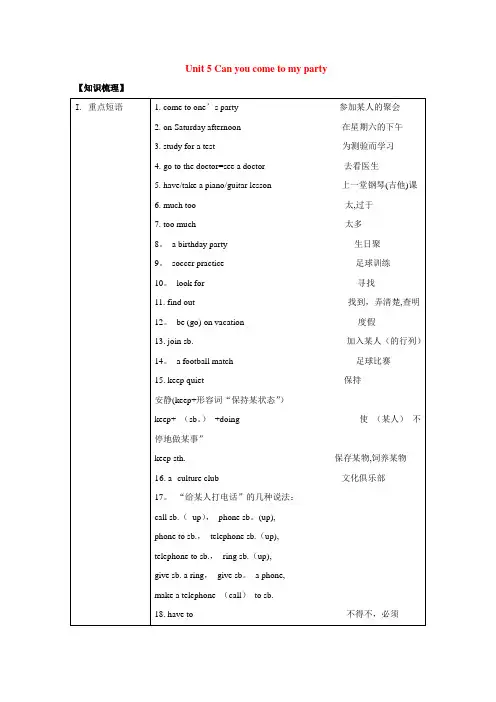
Unit 5 Can you come to my party【知识梳理】I. 重点短语 1. come to one’s party 参加某人的聚会2. on Saturday afternoon 在星期六的下午3. study for a test 为测验而学习4. go to the doctor=see a doctor 去看医生5. have/take a piano/guitar lesson 上一堂钢琴(吉他)课6. much too 太,过于7. too much 太多8。
a birthday party 生日聚9。
soccer practice 足球训练10。
look for 寻找11. find out 找到,弄清楚,查明12。
be (go) on vacation 度假13. join sb. 加入某人(的行列)14。
a football match 足球比赛15. keep quiet 保持安静(keep+形容词“保持某状态”)keep+ (sb。
)+doing 使(某人)不停地做某事”keep sth. 保存某物,饲养某物16. a culture club 文化俱乐部17。
“给某人打电话”的几种说法:call sb.(up),phone sb。
(up),phone to sb.,telephone sb.(up),telephone to sb.,ring sb.(up),give sb. a ring,give sb。
a phone,make a telephone (call)to sb.18. have to 不得不,必须19。
the day after tomorrow 后天20。
a science report 科学报告II. 重要句型邀请用语1. Can you come to my party?= Would you like to come to my party?肯定回答:Sure,I’d love to。
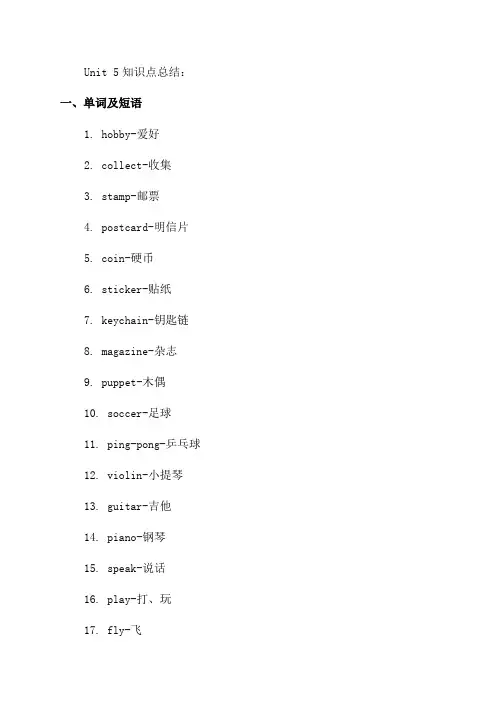
Unit 5知识点总结:一、单词及短语1. hobby-爱好2. collect-收集3. stamp-邮票4. postcard-明信片5. coin-硬币6. sticker-贴纸7. keychain-钥匙链8. magazine-杂志9. puppet-木偶10. soccer-足球11. ping-pong-乒乓球12. violin-小提琴13. guitar-吉他14. piano-钢琴15. speak-说话16. play-打、玩17. fly-飞18. read-读二、重点语法1.动词的第三人称单数形式在英语中,当主语是第三人称单数时,动词要加上-s或-es。
例如:He often helps his mother with housework.(他经常帮助他妈妈做家务。
)2.句子的否定形式3.一般疑问句和特殊疑问句一般疑问句是用来征询对方对所说的事情是否同意,一般用助动词do/does,be动词is(are, am),情态动词can等构成。
特殊疑问句是用来询问特殊信息的问句。
a.一般疑问句的构成:肯定句:He is a student. ---> 一般疑问句:Is he a student?否定句:He is not a student. ---> 一般疑问句:Isn't he a student?b.特殊疑问句的构成:特殊疑问句的构成比较固定,一般是由动词be, do, does等引导。
例如:What is your hobby?(你的爱好是什么?)What does he collect?(他收集什么?)三、常用句型1. Do you have any hobbies?2. What's your hobby?3. What do you collect?5. Does he like playing soccer?6. How many stamps do you have?7. I like collecting stamps.8. She doesn't have any postcards.9. He collects coins from different countries.10. I play the guitar every day.四、日常交际用语1. -- What's your hobby?(你的爱好是什么?)-- My hobby is collecting stamps.(我的爱好是收集邮票。

Unit Five1.clean作动词为“使。
干净”如:clean the table擦桌子clean the floor擦地板2.wait 动词意为“等候,等待”。
Wait in/at a place在某个地方等,如:He is waiting in the room.他正在房间里等着呢。
Wait for sb/sth等候某人/某物,如She is waiting for you at the door.她正在门口等着你呢。
Are you waiting for the bus?你在等车吗?3.talk动词意思为“谈话”如:D on’t talk in class.在课堂上不要讲话。
Talk to/with sb与某人谈话。
Talk to强调一个人在讲,其余人在听。
Talk with强调双方都在讲。
如:My mother is talking with the teacher.我妈妈正在与老师交谈。
Talk about sb/sth谈论某人/某物,如:Don’t talk about others. 不要谈论别人。
We often talk about our class.我们经常谈论我们的班级。
又如:We talk on the phone.我们在电话里交谈。
4.photo名词意思为“照片”。
变为复数加“—s”。
如:two photos两张照片take photos of sb/sth给。
照相,如:She is taking photos of her son.她正在给她的儿子照相。
5.apartment公寓 show电视节目(1)show意思为“给。
看;出示;显示”,常构成“show sb sth”或“show sth to sb”结构。
如Will you kindly show me that coat over there?(注意)在“在show +间接宾语+直接宾语”结构中,若直接宾语为指物的代词it或them时,只能用“show it(them) to sb”结构。
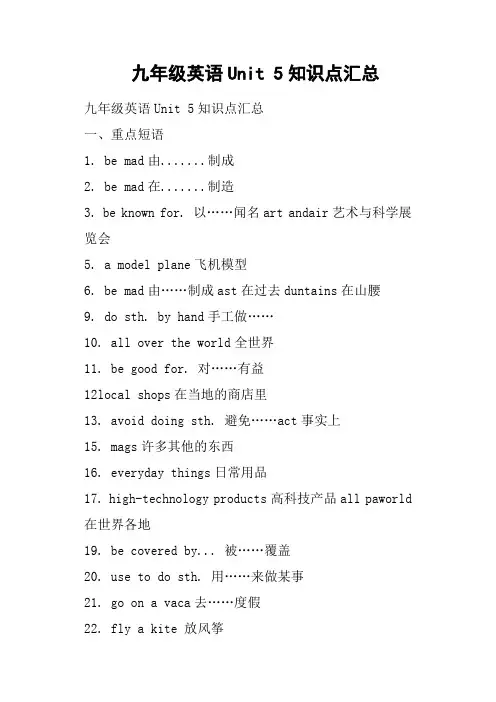
九年级英语Unit 5知识点汇总九年级英语Unit 5知识点汇总一、重点短语1. be mad由.......制成2. be mad在.......制造3. be known for. 以……闻名art andair艺术与科学展览会5. a model plane飞机模型6. be mad由……制成ast在过去duntains在山腰9. do sth. by hand手工做……10. all over the world全世界11. be good for. 对……有益12local shops在当地的商店里13. avoid doing sth. 避免……act事实上15. mags许多其他的东西16. everyday things日常用品17. high-technology products高科技产品all paworld 在世界各地19. be covered by... 被……覆盖20. use to do sth. 用……来做某事21. go on a vaca去……度假22. fly a kite 放风筝2ationalval 国际风筝节24. be painted with... 被画上25. tu变成26. sky lantern 孔明灯27. a fairy tale 一个神话故事28. at a very high heat 在高温下2升入……30. send out 发送……uble 陷人困境32. pu把……放到……二、重点知识点1. be made of/from/in/by/into 辨析(1)be made of表示'由…制成', 一般指能够看出原材料,或发生的是物理变化。
(2)be made from也表示'由…制成',但一般指看不出原材料,或发生的是化学变化。
(3)be made into的意思为'被制成为…'(4)be made in指的是产地,意思为'于(地点/时间)制造'(5) be made by 指由制造者、制造方制造2. produce用法produce 作及物动词时,表示“生产、制造”;可以表示生产汽车、机器通过制造而获得的产品,如produce cars/ planes.也可以表示生产粮食蔬菜、通过种植而获得的产品,如They produce wheat andduce做名词时,是不可数名词,指“产品”,尤其指农产品;【拓展】辨析 product,produce,produduce 作名词用是不可数的,尤指“农产品”,例如:product 多指“工业产品”,也可泛指任何体力、脑力劳动产生的东西,或发源于其他事物的东西,e.g. Shakespeare's plays aduduction 指“生产”;3. avoid用法表示“避开”或“躲避”(l f from)某人或某物;也可表示“防止”(prevent)某事的发生,avoid doingd 的用法many dds of 意为“许多不同种类的”。
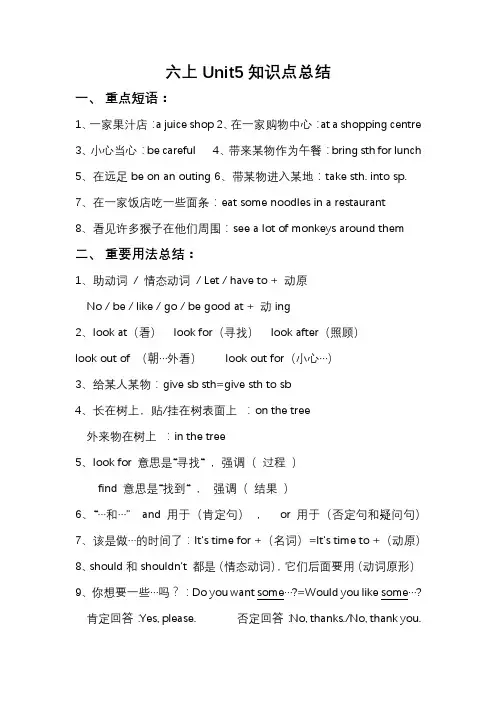
六上Unit5知识点总结一、重点短语:1、一家果汁店:a juice shop2、在一家购物中心:at a shopping centre3、小心当心:be careful4、带来某物作为午餐:bring sth for lunch5、在远足be on an outing6、带某物进入某地:take sth. into sp.7、在一家饭店吃一些面条:eat some noodles in a restaurant8、看见许多猴子在他们周围:see a lot of monkeys around them二、重要用法总结:1、助动词/ 情态动词/ Let / have to + 动原No / be / like / go / be good at + 动ing2、look at(看)look for(寻找)look after(照顾)look out of (朝…外看)look out for(小心…)3、给某人某物:give sb sth=give sth to sb4、长在树上,贴/挂在树表面上:on the tree外来物在树上:in the tree5、look for 意思是“寻找“,强调(过程)find 意思是“找到“,强调(结果)6、“…和…” and 用于(肯定句),or 用于(否定句和疑问句)7、该是做…的时间了:I t’s time for +(名词)=It’s time to +(动原)8、should和shouldn’t 都是(情态动词),它们后面要用(动词原形)9、你想要一些…吗?:Do you want some…?=Would you like some…?肯定回答:Yes, please. 否定回答:No, thanks./No, thank you.三、重点语法:1、它是什么意思?What does it mean?回答:It means…这/那个标志是什么意思?What does this/that sign mean?回答:It means…它们是什么意思?What do they mean?回答:They mean…这/那些标志是什么意思?What do these/those signs mean?回答:They mean…2、禁止饮食:No eating or drinking=can’t eat or drink禁止乱扔垃圾:No littering= can’t litter禁止停车:No parking= can’t park禁止吸烟:No smoking= can’t smoke。
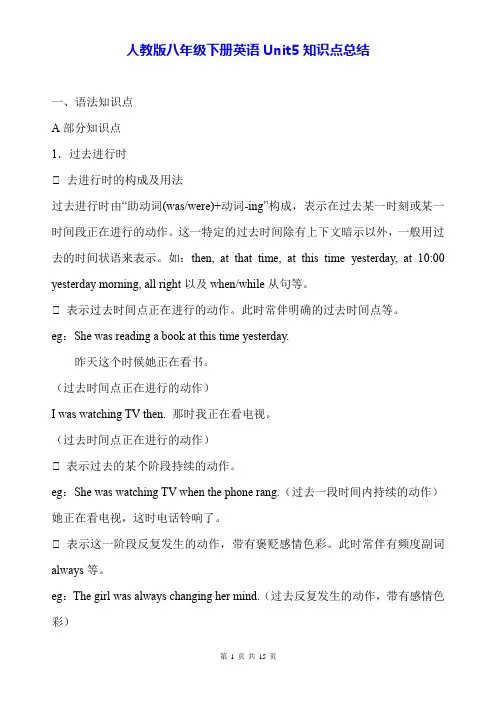
人教版八年级下册英语Unit5知识点总结一、语法知识点A部分知识点1.过去进行时❶ 去进行时的构成及用法过去进行时由“助动词(was/were)+动词-ing”构成,表示在过去某一时刻或某一时间段正在进行的动作。
这一特定的过去时间除有上下文暗示以外,一般用过去的时间状语来表示。
如:then, at that time, at this time yesterday, at 10:00 yesterday morning, all right以及when/while从句等。
❶ 表示过去时间点正在进行的动作。
此时常伴明确的过去时间点等。
eg:She was reading a book at this time yesterday.昨天这个时候她正在看书。
(过去时间点正在进行的动作)I was watching TV then. 那时我正在看电视。
(过去时间点正在进行的动作)❶ 表示过去的某个阶段持续的动作。
eg:She was watching TV when the phone rang.(过去一段时间内持续的动作)她正在看电视,这时电话铃响了。
❶ 表示这一阶段反复发生的动作,带有褒贬感情色彩。
此时常伴有频度副词always等。
eg:The girl was always changing her mind.(过去反复发生的动作,带有感情色彩)这个女孩老是改变主意。
❶ 表示过去动作延迟到以后发生,即用过去进行表过去将来,此类动词是一些位置的变化的词。
eg:He told me that he was going soon.(过去进行表将来)他告诉我他很快就要走了。
❶ 过去进行时的一般疑问句句型:Be(Was/Were)+主语+现在分词+其他?肯定回答:Yes,主语+be(was/were).否定回答:No,主语+be(was/were) not.eg:--Were you cooking at that time? 那时,你在做饭吗?--Yes, I were.是的。
人教版九年级全一册英语Unit5单元语法知识点总结本单元重点短语的具体用法1. be made of:表示某物由某种材料制成,且制成后原材料仍可辨认。
例如:- This table is made of wood. 这张桌子是由木头制成的。
2. be made from:与“be made of”意思相近,但强调制成的物品已经看不出原材料。
例如:- Paper is made from wood. 纸是由木头制成的。
3. be known for:意为“因……而闻名”。
例如:- This city is known for its beautiful beaches. 这座城市以其美丽的海滩而闻名。
4. be used for:表示某物被用于某种目的。
例如:- This tool is used for cutting wood. 这个工具是用来砍木头的。
5. no matter:“不论;无论”,引导让步状语从句。
例如:- No matter what happens, I will always support you. 无论发生什么,我都会一直支持你。
6. be covered with:表示被某种东西覆盖。
例如:- The ground is covered with snow. 地面被雪覆盖了。
7. as far as I know:“据我所知”,常用在句首。
例如:- As far as I know, she is a very kind person. 据我所知,她是一个非常善良的人。
8. by hand:“用手”,强调手工制作。
例如:- These cookies were made by hand. 这些饼干是手工制作的。
9. be good for:“对……有益”,例如:- Exercising is good for your health. 锻炼对你的健康有好处。
10. on the last Friday of each month:“在每个月的最后一个星期五”,例如:- The meeting is always held on the last Friday of each month. 会议总是在每个月的最后一个星期五举行。
人教版九年级英语全册Unit5知识点一、常用短语1.be made of由...制成的(表示制成成品后,仍可看出原材料是什么)2.be made from由...制成的(在成品中已无法辨认原材料)3.be known for以...闻名4.be used for被用于5.no matter不论;无论6.be covered with用...覆盖7.as far as i know据我所知8.by hand用手9.be good for对...有益10.on the last friday of each month最后一个星期五11.be good at擅长12.make high-technology products制造高科技产品13.the earth’s surface地球表面14.many different kinds of 许多不同种类的15.fly a kite放风筝16.such as例如17.according to根据按照18.ask for help 请求帮助19.a symbol of什么的象征20.put...on把什么放在上面21.be used for被用于做什么22.good luck好运23.at a very high heat在高温下24.be made in在...制造的25.be famous for以...著名26.on the sides of mountains在山腰上27.traffic accident交通事故28.a kite festival风筝节29.be from来自30.turn...into把...变成...31.send out放出32.in trouble处于困境中33.rise int上升上涨34.paper cutting剪纸35.be used by被...使用36.during the spring festival在春节期间37.sky lanterns孔明灯38.all over the world全世界二、短语用法集锦no matter +what / when / where =whatever / whenever / wherever “无论什么/什么时候/哪里”it放在find / found 后做形式宾语的用法It seems that +从句“好像……” 4.buy sb.sth.=buy sth for sb 给某人买某物5.avoid doing sth 避免做某事6.allow sb to do sth 允许某人做某事7.want to do sth 想做某事8.learn to do sth 学会做某事9.It takes + sb. +一段时间+ to do sth.做某事花费某人多长时间10.try to do sth 尽力做某事10.辨析:be made of 由...制作/制造(材料):在成品中能看出原材料be made from由...制造/制成(材料):在成品中看不出原材料be made in在...制作/制造 (产地) Made in China.中国制造例:The desk is made of wood. Bread is made of flour.The paper is made from wood. Wine is made of grapes.This kind of plane is made in China.11. be famous for 以...闻名;为人知晓be known for因...而闻名be famous as作为...而闻名be known as作为...而闻名例:Jingdezhen is famous for china.China is famous for its tourism.Mo Yan is very famous as a writer.12. allow sb to do sth允许某人做某事allow doing sthbe allowed to do sth例:Please allow me to come in.My boss doesn't allow me to use the telephone.We were not allowed to talk in class.They allowed smoking in this room only.注意:allow只可搭配动名词短语作宾语,不可直接搭用动词不定式作宾补,即只可说allow doing sth,不可说allow to do sth.13.一般现在时的被动语态(见P155页)结构:am/is/are+过去分词。
高中英语必修5(外研版)Unit 5 The Great Sports Personality知识点总结一、重点词汇athletics·基本用法athletics n. 竞技;体育运动;田径运动She showed us the athletics awards she had won.她给我们看她赢得的体育运动奖。
I like the athletics events and the team sports.我喜欢田径项目和团体项目。
·知识拓展--相关单词1. athletic adj. 运动的,运动员的;体格健壮的The boy got in to the athletic school after a special test.男孩经过一次专门测验后进了体育学校。
John is an athletic boy. He is good at running.约翰体魄健壮。
他擅长跑步。
2. athlete n. 运动员,体育家;身强力壮的人The athlete is able to jump two meters.这位运动员能跳两米高。
ring·基本用法1. ring n. 拳击场;戒指;铃声;环形物The boxer poked his opponent out of the ring.拳击手将对手击出了拳击台。
He can't get his ring off his finger.他无法指导戒指从手指上拿下来。
2. ring v. 按铃;回响;打电话I'll ring you up some time during the week.本周的某个时候我给你打电话。
track·基本用法1. track n. 轨道;足迹;小道I like to watch field and track events.我喜欢观看田径比赛。
What you just said is completely off the track.你刚才讲的话彻底离题了。
八上unit5知识点总结一、重点短语:1、在野外in the wild2、野生动物wild animals3、<口>不可能no way4、主要以…为生l ive mainly on…5、大熊猫giant panda6、与…同样t he same…as…7、出生be born 8、出生时at birth9、因此as a result 10、在…的帮助下w ith the help of…11、处境危险in danger 12、不再…n ot…any more=no more 13、立刻,马上right away 14、真遗憾!what a shame!15、在白天in the daytime 16、储存一些食物save some food 17、一个有关…的报告a report o n… 18、冬眠sleep through the winter 19、实际上in fact 20、面临严重的问题face serious problems 21、迷路get lost 22、第一次去外面go outside for the first time23、做某事一小会儿do sth for a short while24、随时成为餐桌上的菜become dishes on the table any time25、计算出简单的数学题work out easy maths problems二、重要用法总结:1、hunt(动词,打猎)---hunter(名词,猎人)lose(动词,丢失,迷失)---lost(形容词,迷路的,迷失的)open(动词,打开)---close(动词,关闭)open(形容词,开的)---closed(形容词,关的)die(动词,死)---dead(形容词,死的)---death(名词,死亡)danger(名词,危险)---dangerous(形容词,危险的)wolf的复数是(wolves)human的复数是(humans)2、free 的意思有:(自由的,免费的,空闲的)3、“请你……,好吗?”Could/would you please + 动词原形…?其否定式是在please后直接加not。
九上unit5知识点总结一、重点短语:1、art form 艺术形式2、musical talent 音乐天赋3、b e known/famous for… 因…而著名4、b e known/famous as…作为…而著名5、dividing line 分界线6、out of breath 上气不接下气7、African American非洲裔8、make up 编造9、local colour 地方特色10、have a (real) gift for…对…(真的)有天赋11、a world-famous composer一个世界著名的作曲家12、common objects 普通的东西13、think/speak highly of 高度评价14、classical music 古典音乐15、in all directions 朝四面八方16、be crazy about sth 对…着迷二、重要用法总结:1、music (n.)音乐—musical (adj.)音乐的—musician (n.)音乐家win (v.)获胜—winner (n.)获胜者compose (v.)创作—composer(n.)作曲家centre (n.)中心—central (adj.)中心的control—controlled—controlled—controllingsucceed (v.)成功—success (n.)成功—successful (adj.)成功的—successfully (adv.)成功地breath (n.)呼吸—breathe (v.)呼吸last (v.)持续—lasting (adj.)持续的value (v./n.)珍视重视/价值—valuable (adj,)宝贵的珍贵的Africa (n.)非洲—African (adj./n.)非洲的/非洲人America (n.)美国—American (adj./n.)美国的/美国人2、present sb with sth=present sth to sb 颁发某物给某人3、praise sb for doing sth 因做某事表扬某人4、encourage sb to do sth鼓励某人做某事encourage sb not to do sth鼓励某人不要做某事5、show/have an interest in doing sth =show/have/become interested in doing sth对做…感兴趣6、go on to do sth 继续去做另一件事go on doing sth 继续做原来没有做完的事7、get to do sth 逐渐开始做事8、last for + 时间持续…时间9、“in + 一段时间”,用一般将来时,对它提问时用“How soon ”10、have a (real) gift for doing sth 对做…(真的)有天赋三、重点语法:because/since/as 引导的原因状语从句1、because 译为“因为”,表示动作发生的直接原因,用来说明人们所不知道的原因。
八年级英语下册Unit-5知识点总结Unit5-What-were-you-doing-w hen-the-rainstorm-cameUnit5 What were you doing when the rainstorm came?一.基础知识讲解.What were people doing yesterday at the time of the rainstorm?昨天当暴风雨来临的时候人们正在做些什么?【解析1】过去进行时过去进行时态⑴ .用法:①过去某个时间正在发生的动作He was cooking at six last night. 昨天晚上六点,他正在做饭。
②过去某段时间正在发生的动作I was staying here from March to May last year.去年从3月到5月,我一直呆在这里。
⑵ .与过去进行时连用的时间状语,常见的有at nine last night/ at that time= then/at this time yesterday /或有when the teacher came in/ while he was reading的提示⑶过去进行时的构成:was\were +现在分词⑷过去进行时的四个基本句型肯定句He was cooking at six lastnight.否定句He was not cooking at six last night.一般疑问句Was he cooking at six last night?两回答Yes ,he was. No, he wasn’t.特殊疑问句What was he doing at six last night?⑸过去进行时的固定句型Jim was reading when the teacher came in. 当老师进来的时候,吉姆正在读书。
Jim was reading while Kate was watching TV.在凯特正在看电视的同时,吉姆正在读书。
Unit5 Section A 1a-2d 知识提纲一、词形转换1.environment n. 环境→adj. environmental 自然环境的,有关环境的2.leaf n. 叶,叶子→复数(pl.)leaves3 wide adj. 宽的,宽阔的→adv. widely 广泛地,普遍地二、短语1. be known for 以……闻名,= be famous for2.be made of 由……制成3. be made from 由……制成4. be made in + 地点产于某地5. all over the world 全世界6. by hand 手工地7. be good for 对……有益8. on the side of the mountains 在山边上三、词法和句法1.be made of“由…制成”主语为制成品of 后接原材料,制成品能看见原材料。
be made from“由…制成”主语为制成品from后接原材料,成品看不见原材料。
记忆顺口溜:be made of 与be made from 用法由物制造,方式有两种;样子很相似,用法不相同;of两字母,材料能看出;from四字母,材料看不出。
be made in + 地点某物产于某地The desk wood . 桌子是由木头做的。
Paper wood . 纸是由木材做的。
The kind of watch Shanghai .这种手表产于上海。
2.as far as I know 据我所知据我所知,李先生已经去美国了。
I know ,Mr. Li has gone to America.3. both …and ………和……都……,不但……而且……连接主语时,动词为复数。
not only …but also…不但……而且……连接主语时,动词就近原则。
either …or…或者……或者……连接主语时,动词就近原则。
neither…nor…既不……也不……连接主语时,动词就近原则。
Tom Jack know my address . They often drop by my home .A.Not , butB. Both , andC. Either , orD. Not only , but also4. It seems that ………似乎……seem + adj. / seem to do sthIt seems that he is going to leave here . 似乎他要离开这里。
= He seems to leave here .Unit5 Section A 3a-4c 知识提纲(P35-36)一、词形转换1. produce v. 生产,制造→n.product 产品2. France n. 法国→adj. French法国的3.Germany n. 德国→adj.German 德国的二、词法和句法1. search for 搜寻,寻找相当于look for2.no matter 不论,无论后接特殊疑问词how / when / where /which/who /what= 特殊疑问词+ ever 表示“无论怎样/ 何时/哪里/哪个/谁/什么”引导让步状语从句。
No matter what he does , I believe him . = he does , I believe him .3. hardly adv. 几乎不表示否定含义I can hardly hear you , ?4. avoid v. 避免,回避avoid doing sth . 避免做某事You should avoid such a mistake . (make)5. be good for 对……有益be good at 擅长be good with sb. 与……和睦相处be good to 对……好6. everyday adj. 每天的,日常的every day 每日,每天相当于频率副词,做时间状语。
He reads everyday English every day . 他每天都读日常英语。
7. continue v. 继续,连续continue to do sth . 继续/ 接着做另一件事情continue doing sth . 继续做原来的事情After he finished reading a novel , he continued to play games with his friends .他读完小说后跟朋友们继续玩游戏。
8.find (found , found ) v. 发现, 发觉find it + adj. + to do sth .I find it very difficult to learn English well . 我觉得学好英语很难。
find it + adj. + that-clause 是一个复合句, it 是形式宾语 ,that 从句是真宾语。
I find it relaxing that I can lie on the beach .我发现我能躺在海滩上很令人放松。
find sb. doing sth . 发现某人正在做某事I found some boys swimming in the river .我发现一些男孩正在河里游泳。
Unit5 Section B1a-2b 知识提纲一、 词形转换1. international adj. 国际的 → n. internation 国际2. celebrate v. 庆祝→n. celebration 庆典, 庆祝活动3.live v.生活→ adj. lively 生气勃勃的4. history n. 历史→ adj. historical 历史的4. complete adj. 完整的 , 完全的 →adv. completely 完全地 , 完整地二、短语1. find out 弄清楚, 查明2. go on vacation (to)去度假3.turn into 变成4.according to 根据 ,按照5.in trouble 在困境中6.be covered with 被……覆盖三、词法和句法1. Have / has been around 这是习语 ,意思是“已经存在”Poetry has been around for centuries . 诗歌已经存在几个世纪了。
2. allow v. 允许, 准许allow doing sth 允许做某事allow sb. to do sth 允许某人做某事be allowed to do sth . 被允许做某事It ’s not allowed to smoke here . 这儿不允许吸烟。
3. use v. 使用 use sth. to do sth. 用某物做某事 。
be used to do sth. 被用来做某事be / get used to + n. / pron. / doing sth . 习惯于做某事be used for doing sth . 用来做某事=be used to do sth .4.It took me about half an hour to get to the airport .I spent two yuan buying / on the pen .The pen cost me two yuan .Grammar (语法) 被动语态一、语态概述英语中有两种语态:主动语态和被动语态。
英语的语态是通过动词形式的变化表现出来的。
主动语态表示主语是动作的执行者。
例如:Many people speak English. 主语people 是动词speak 的发出者。
被动语态表示主语是动作的承受者。
例如:English is spoken by many people. 主语English 是动词speak 的承受者。
二、被动语态的构成主语 句 型 take it It takes sb. + 时间 + to do sth. spend 人 on sth . 人 spend + 金钱 / 时间 + in doing sth. pay 人 人 pay + 钱数 for sth. 人 pay for sth. cost 物 物 cost + 钱数 (vi.) 物 cost + sb. + 钱数 (vt.)被动语态由“be+及物动词的过去分词”构成。
不及物动词本身没有被动语态。
人称、数和时态的变化是通过be的变化表现出来的。
三、各种时态被动语态的构成1.一般现在时:am/is/are+动词过去分词Cars are made by them.2.一般过去时:was/were+动词过去分The MP3 was bought by my father.3.含有情态动词的被动语态,由“情态动词+be+过去分词”构成,例如:we can repair this watch in two days.→This watch can be repaired in two days.四、主动语态变被动语态的方法1.把主动语态的宾语变为被动语态的主语。
2.把主动语态的谓语变为被动语态的谓语。
3.把主动语态的主语变为被动语态的by短语。
(① by短语可以省。
② by短语后跟代词的宾格。
)主变被解题步骤1. 划分句子成分,找宾语----即动作的承受者2. 判断宾语的单复数----即be动词的单复数.3. 判断动词的时态----即be动词的时态.4. 修改谓语的形式----即原句动词改为过去分词5. 修改原句的主语----即by+ 宾语(原主语).They make shoes in that factory.①②③→Shoes are made by them.(宾变主,主变宾,谓动变成be done 形,人称、数、格随着变)五、被动语态的用法(1)不知道或没有必要说明动作的执行者是谁。
Some new computers were stolen last night. (不知道电脑是谁偷的)(2)强调动作的承受者,而不强调动作的执行者。
The window was broken by mike.窗户是迈克打破的。
巩固提升:一、单项填空( )1.The old man is good ________swimming, and even now he often swims across Tuojiang River after supper. A.over B.through C.to D.at( )2.—Your sweater looks nice.Is it made of wool?—Yes, and it's made ________ Shanghai.A.by B.in C.for D.from( )3.Sanya is famous ________ its beautiful beaches.A.of B.for C.as D.from( )4.________ happens, I'll stand by you.A.So B.ButC.Or D.No matter what( )5.My parents don't allow me to ________ out at night.A.went B.goingC.go D.goes( )6.I have some good friends, ________ dogs, cats and toys.A.as for B.such asC.for example D.suddenly( )7.Miss Taylor never wastes money on anything too expensive, even though she can ________ to.She has donated much of the money she saved to charities.A.allow B.remindC.afford D.take( )8.When you are ________, I will help you.A.in trouble B.in helpC.with trouble D.in hope( )9.The whole city is ________ fog.A.cover with B.covered withC.cover D.covered( )10.—How do you study for a test?—________ working with friends.A.By B.WithC.On D.At( )11.The sweater is not the right ________ for me.—Well, shall I get you a bigger one or a smaller one?A.price B.colorC.size D.material( )12.I've got several novels written by Mo Yan.You can borrow ________ if you like.A.it B.oneC.every D.either( )13.I like to read English in the garden because the flowers in it smell ________.A.good B.wellC.bad D.badly( )14.—“Frog”, Mo Yan's latest novel, please!—Sorry, it ________.But it will come out again soon.A.sold out B.is sold outC.has sold outD.were sold out( )15.—How often do you chat with your friends online?—________ I'm busy with my study.A.Only one month.B.About twice a month.C.Almost every day.D.Maybe in two weeks.( )16.Many trees and flowers ________ in our school every year and they make our school a beautiful garden.A.have planted B.are plantedC.were planted D.will be planted( )17.If our government ________ attention to controlling food safety now, our health ________ in danger.A.won't pay; isB.doesn't pay; isC.won't pay; will beD.doesn't pay; will be( )18.Steve got over ten letters _______ his pen pals _______ their New Year's resolutions last year.A.from; about B.to; ofC.about; from D.to; about( )19.I ________ to the cinema.Would you like to come with me?A.go B.am goingC.have gone D.went( )20.—Could you tell me________ at nine o'clock last night?—Er, I was washing clothes.A.what you were doingB.what were you doingC.what you are doingD.what are you doing二、书面表达假设某中学生英文报开展关于村庄变化的征文活动,请你根据下表所提示的要点,以“Change in Our Town”为题,用英语为该报写一篇稿件,简述社会、家庭、学校及个人生活中的若干变化,展望未来生活及如何为此努力。